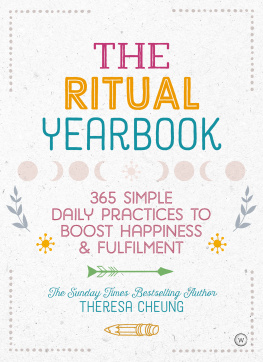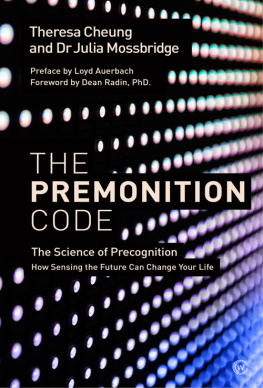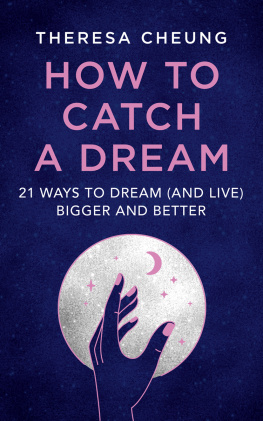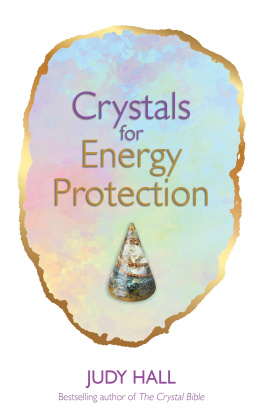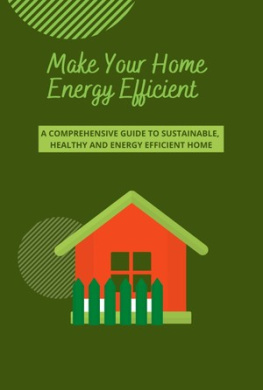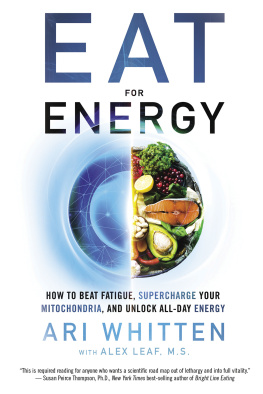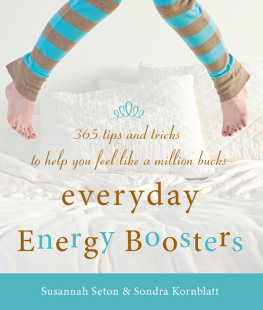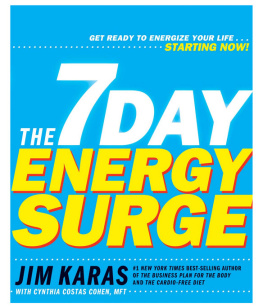Along with more time and more money, more energy is high on everyones wish list. Without doubt, energy is an essential in todays overstretched, high-speed, 24/7 wired world; but it can be hard to recharge your batteries when there is a constant drain on your energy supplies.
Energy-shutdown is something most of us have experienced from time to time. Remember that drained feeling when, however much you have looked forward to a party, new movie or hot date, you just cant summon the energy to go? What is tougher to recognise, however, is low-key energy-drain. This is when you dont get that tired-all-over feeling but you do experience a gradual but increasing lack of enthusiasm for activities you used to get excited about. Getting out of bed in the morning seems harder, concentrating on what you are doing is a challenge and, most surprisingly, as you arent normally like this, you find yourself getting worked up about the silliest things.
If this grumpy and run down theme is starting to sound very familiar, dont despair. There are energy-drainers all around us some obvious, some hidden. The good news is that you can find ways to deal with virtually all of them. Try one or all of the 100 simple and practical energy boosters in this book and, however hectic your lifestyle, youre bound to see your energy levels soar. Use them both as quick pick-me-ups when the going gets tough, and as energisers to increase your stamina in the long run, so that you have all the get-up-and-go you need to rise and shine every day.
Use them to help put a spring in your step and a twinkle in your eyes so that you look and feel alert, vibrant and sparkling with energy.
Energy is life. It is the invisible force that animates the human body and permeates everything in the natural world, including animals, plants, trees and mountains, as well as the earth, sun, moon and stars. Whenever something moves, heats, cools, grows, changes or produces light or sound, energy is involved.
One of the simplest forms of energy is metabolic; this is the energy we get from the food we eat and the air we breathe. In short, energy means that birds can fly, winds can blow, the sun can shine, cars can go fast, light bulbs can glow and you can read this book. Without energy there would be nothing: no life, no movement, no light, no booksnothing.
Vital energy is a term used to describe the collective physical energies of the mind and body working together to produce feelings of well-being. In other words, it means feeling glad to be alive, and bursting with health and energy. Typically children are bursting with vital energy but an increasing number of adults are finding it harder and harder to remember the last time they felt like that.
Energy and health
A healthy person is a person who has a sense of well-being characterised by a high level of energy and the ability to cope with stress. Feeling tired and stressed a lot of the time is not healthy. Unfortunately, many of us unconsciously settle for energy levels that are lacklustre, in the belief that it is normal to run on empty. But low energy levels are certainly not normal or healthy.
Energy is our most precious human resource. If we dont have it, not only is our immunity low and our health at risk, but we dont have the oomph we need to rise to the challenge of work, have fulfilling relationships and experience the joy of being alive that is our birthright. If we dont have energy, we are simply going through the motions of life.
Although energy can put a spring in our step and help keep disease at bay, its important to remember that healthy energy levels are also balanced energy levels. In other words, we need to have the energy to meet the challenges of life without going into overdrive. Overdrive is certainly not good for our health and well-being because it makes it hard to switch off and relax, and increases our risk of stress and poor health. What we need to be aiming for isnt constantly high energy levels but a steady flow of balanced physical, emotional and mental energy; these balanced levels are essential if we are genuinely to experience good health and vitality.
Energy peaks and troughs
Its important to know that our energy level wont remain constant throughout the day; there will be natural dips. In fact, scientists have identified 2.16 p.m. as the time most of us experience an energy dip, so if you get a slump around this time it does not mean that anything is wrong.
Some energy lows are of our own doing caused by those late nights or too much caffeine but the conductor of our energy levels is a cluster of cells that lie deep within our brains, directing our daily release of hormones, our shifts in body temperature and our blood pressure. This conductor produces what are called circadian rhythms.
Research has shown that one of the most powerful regulators of our internal body clock or circadian rhythm is light. When photoreceptors in our eyes and other places absorb light, they send a signal to our brains to stop producing melatonin, the so-called sleep hormone. With light comes a cessation of melatonin production, and our gradually increasing body temperature makes us feel alert. During the day our temperature fluctuates, rising in the mid-morning, hitting a low at around 3 p.m. and then rising again in mid-afternoon; this could explain why we often get a second wind around this time. By 11 p.m., when the lights are usually turned off, melatonin production starts and temperature, heart rate and blood pressure drop in preparation for sleep.
Its important to understand the physical rhythms that guide our days so we can learn to make the most of energy peaks and prepare ourselves for energy troughs. One way to keep track is to have an energy diary and write down the times when you feel alert or tired during the day. Once you are aware of your downtime, you can plan your life accordingly. For example, if you get a slump at around 3 p.m. you can avoid planning meetings at that time or use some of the instant pick-me-up tips on pages 17589. If, however, you find that your energy is constantly low or that you have more troughs than peaks during the day, your energy levels are lower than they should be.
Symtoms of low energy
Symptoms of low energy vary from person to person. In general when your energy is low, although you may be able to cope with your normal routine, youve lost that spring in your step and anything that requires a little more effort tires you quickly. You may often simply wake up tired and just have a general feeling of being out of sorts.
To rate your energy levels, answer the following questions:
When you wake up in the morning, do you drag yourself reluctantly out of bed?
Do you find yourself longing for an afternoon nap in the morning?
At the end of the day, is slumping in front of the TV all that you want to do?
During meetings do you easily become distracted or bored, or find it hard to keep your eyes open?
Do you sometimes feel that you havent got the energy to get through the day?
Do you fall asleep the moment your head hits the pillow?
Do you often feel so wound up that it is hard to get to sleep?
Does seeing or talking to friends seem like a huge effort sometimes?
Is it hard to remember things or to concentrate at work?
Do you find yourself getting worked up or impatient about the smallest things?
Do you need caffeine or other stimulants to help you through the day?
Are you susceptible to colds and other minor illnesses?
Do you find it difficult to raise much enthusiasm for doing anything at all?
Is it hard for you to accept or deal with change?

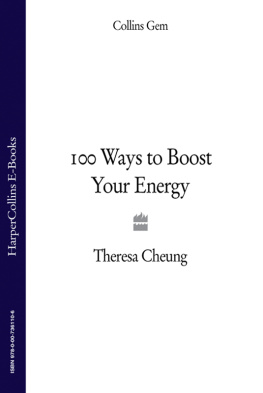

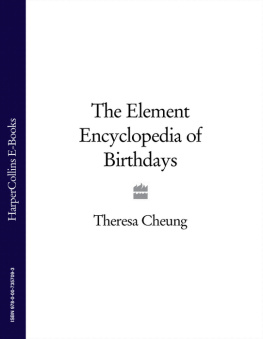
![Theresa Cheung - The Dream Dictionary from A to z; [Revised edition]](/uploads/posts/book/162615/thumbs/theresa-cheung-the-dream-dictionary-from-a-to-z.jpg)
